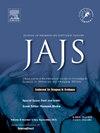Functional and Radiological Outcomes Following Arthroscopic-Assisted Reduction and Fixation of Intra-Articular Distal Radius Fractures
Q4 Medicine
引用次数: 0
Abstract
Intra-articular distal radius fractures (DRFs) are prevalent injuries that are usually difficult to treat and rehabilitate. These injuries may be associated with ligamentous injuries or intra-articular loose fragments. This study aims to assess the functional and radiological results of using arthroscopic-assisted reduction and fixation, which offers direct visualization of the joint surface, evaluation of intra-articular ligaments, and removal of loose fragments, potentially enhancing recovery outcomes. This quasi-experimental interventional study evaluated the functional and radiological outcomes of arthroscopic-assisted reduction and fixation for intra-articular DRFs. The study included 26 patients who met specific inclusion criteria, and data collection involved preoperative assessment, patient preparation, operative measures, postoperative care, and follow-up evaluations using various scoring systems. The range of motion showed a significant (P < 0.001) improvement over the study duration: flexion increased from 42.81° ± 11.81° at 6 weeks to 54.23° ± 14.95° at 12 months, and extension improved from 56.88° ± 13.28° to 68.38° ± 13.43°. In addition, there was a significant reduction in disability and wrist-related symptoms, as indicated by improvements in the Disabilities of the Arm, Shoulder, and Hand (DASH) scores (6 weeks: 25.80 ± 15.85 vs. 12 months: 5.27 ± 8.61; P < 0.01) and Patient-Rated Wrist Evaluation (PRWE) scores at the same follow-up intervals (6 weeks: 46.04 ± 22.49 vs. 12 months: 9.54 ± 12.03; P < 0.001). Chronic illness and injuries like triangular fibrocartilage complex tears affected outcomes negatively. Age, ulnar variance, and palmar tilt were significantly correlated with DASH and PRWE scores. Arthroscopic-assisted reduction and fixation for intra-articular DRFs resulted in favorable outcomes regarding the range of motion, disability, and wrist-related symptoms. Further research and long-term follow-up studies are recommended to validate the positive outcomes of arthroscopic-assisted reduction and fixation for intra-articular DRFs, compare it with other surgical approaches, and assess its economic implications.关节镜辅助桡骨远端骨折复位和固定术后的功能和放射学结果
桡骨远端关节内骨折(DRF)是一种常见的损伤,通常难以治疗和康复。这些损伤可能伴有韧带损伤或关节内松散碎片。关节镜可直接观察关节表面、评估关节内韧带并清除松动碎片,从而提高康复效果。 这项准实验性介入研究评估了关节镜辅助缩紧和固定术治疗关节内 DRF 的功能和放射学效果。研究纳入了26名符合特定纳入标准的患者,数据收集包括术前评估、患者准备、手术措施、术后护理以及使用各种评分系统进行的随访评估。 在研究期间,患者的活动范围有了明显改善(P < 0.001):屈曲从 6 周时的(42.81° ± 11.81°)增加到 12 个月时的(54.23° ± 14.95°),伸展从(56.88° ± 13.28°)增加到(68.38° ± 13.43°)。此外,残疾和腕部相关症状也明显减少,这体现在相同随访时间间隔内的手臂、肩部和手部残疾(DASH)评分(6 周:25.80 ± 15.85 vs. 12 个月:5.27 ± 8.61;P <0.01)和患者腕部评估(PRWE)评分(6 周:46.04 ± 22.49 vs. 12 个月:9.54 ± 12.03;P <0.001)的改善。慢性疾病和损伤(如三角纤维软骨复合体撕裂)对疗效有负面影响。年龄、尺侧方差和掌侧倾斜与 DASH 和 PRWE 评分显著相关。 关节镜辅助下的关节内DRF缩窄和固定术在活动范围、残疾和腕部相关症状方面都取得了良好的效果。建议开展进一步研究和长期随访研究,以验证关节镜辅助关节内DRFs复位和固定术的积极疗效,将其与其他手术方法进行比较,并评估其经济意义。
本文章由计算机程序翻译,如有差异,请以英文原文为准。
求助全文
约1分钟内获得全文
求助全文
来源期刊

Journal of Arthroscopy and Joint Surgery
Medicine-Orthopedics and Sports Medicine
CiteScore
0.60
自引率
0.00%
发文量
1
期刊介绍:
Journal of Arthroscopy and Joint Surgery (JAJS) is committed to bring forth scientific manuscripts in the form of original research articles, current concept reviews, meta-analyses, case reports and letters to the editor. The focus of the Journal is to present wide-ranging, multi-disciplinary perspectives on the problems of the joints that are amenable with Arthroscopy and Arthroplasty. Though Arthroscopy and Arthroplasty entail surgical procedures, the Journal shall not restrict itself to these purely surgical procedures and will also encompass pharmacological, rehabilitative and physical measures that can prevent or postpone the execution of a surgical procedure. The Journal will also publish scientific research related to tissues other than joints that would ultimately have an effect on the joint function.
 求助内容:
求助内容: 应助结果提醒方式:
应助结果提醒方式:


